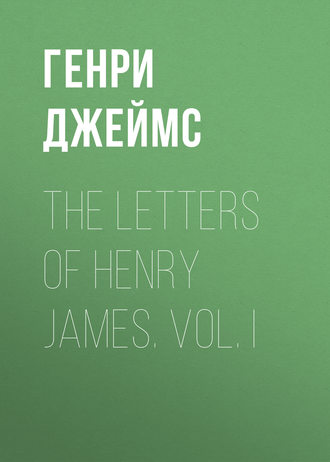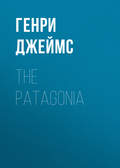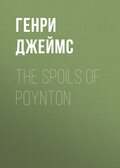
Генри Джеймс
The Letters of Henry James. Vol. I
To his Father
Great MalvernMarch 19th, '70.
Dear Father,
The other afternoon I trudged over to Worcester—through a region so thick-sown with good old English 'effects'—with elm-scattered meadows and sheep-cropped commons and the ivy-smothered dwellings of small gentility, and high-gabled, heavy-timbered, broken-plastered farm-houses, and stiles leading to delicious meadow footpaths and lodge-gates leading to far-off manors—with all things suggestive of the opening chapters of half-remembered novels, devoured in infancy—that I felt as if I were pressing all England to my soul. As I neared the good old town I saw the great Cathedral tower, high and square, rise far into the cloud-dappled blue. And as I came nearer still I stopped on the bridge and viewed the great ecclesiastical pile cast downward into the yellow Severn. And going further yet I entered the town and lounged about the close and gazed my fill at that most soul-sustaining sight—the waning afternoon, far aloft on the broad perpendicular field of the Cathedral spire—tasted too, as deeply, of the peculiar stillness and repose of the close—saw a ruddy English lad come out and lock the door of the old foundation school which marries its heavy gothic walls to the basement of the church, and carry the vast big key into one of the still canonical houses—and stood wondering as to the effect on a man's mind of having in one's boyhood haunted the Cathedral shade as a King's scholar and yet kept ruddy with much cricket in misty meadows by the Severn. This is a sample of the meditations suggested in my daily walks. Envy me—if you can without hating! I wish I could describe them all—Colwell Green especially, where, weather favouring, I expect to drag myself this afternoon—where each square yard of ground lies verdantly brimming with the deepest British picturesque, and half begging, half deprecating a sketch. You should see how a certain stile-broken footpath here winds through the meadows to a little grey rook-haunted church. Another region fertile in walks is the great line of hills. Half an hour's climb will bring you to the top of the Beacon—the highest of the range—and here is a breezy world of bounding turf with twenty counties at your feet—and when the mist is thick something immensely English in the situation (as if you were wandering on some mighty seaward cliffs or downs, haunted by vague traditions of an early battle). You may wander for hours—delighting in the great green landscape as it responds forever to the cloudy movements of heaven—scaring the sheep—wishing horribly that your mother and sister were—I can't say mounted—on a couple of little white-aproned donkeys, climbing comfortably at your side. But at this rate I shall tire you out with my walks as effectually as I sometimes tire myself.... Kiss mother for her letter—and for that villainous cold. I enfold you all in an immense embrace.
Your faithful son,H.
To Charles Eliot Norton
Professor Norton and his family were still at this time in Europe. Arthur Sedgwick was Mrs. Norton's brother.
Cambridge, (Mass.)Jan. 16, '71.
My dear Charles,
If I had needed any reminder and quickener of a very old-time intention to take some morning and put into most indifferent words my frequent thoughts of you, I should have found one very much to the purpose in a letter from Grace, received some ten days ago. But really I needed no deeper consciousness of my great desire to punch a hole in the massive silence which has grown up between us....
Cambridge and Boston society still rejoices in that imposing fixedness of outline which is ever so inspiring to contemplate. In Cambridge I see Arthur Sedgwick and Howells; but little of any one else. Arthur seems not perhaps an enthusiastic, but a well-occupied man, and talks much in a wholesome way of meaning to go abroad. Howells edits, and observes and produces—the latter in his own particular line with more and more perfection. His recent sketches in the Atlantic, collected into a volume, belong, I think, by the wondrous cunning of their manner, to very good literature. He seems to have resolved himself, however, [into] one who can write solely of what his fleshly eyes have seen; and for this reason I wish he were "located" where they would rest upon richer and fairer things than this immediate landscape. Looking about for myself, I conclude that the face of nature and civilization in this our country is to a certain point a very sufficient literary field. But it will yield its secrets only to a really grasping imagination. This I think Howells lacks. (Of course I don't!) To write well and worthily of American things one need even more than elsewhere to be a master. But unfortunately one is less!… I myself have been scribbling some little tales which in the course of time you will have a chance to read. To write a series of good little tales I deem ample work for a life-time. I dream that my life-time shall have done it. It's at least a relief to have arranged one's life-time....
There is an immensity of stupid feeling and brutal writing prevalent here about recent English conduct and attitude—innocuous to some extent, I think, from its very stupidity; but I confess there are now, to my mind, few things of more appealing interest than the various problems with which England finds herself confronted: and this owing to the fact that, on the whole, the country is so deeply—so tragically—charged with a consciousness of her responsibilities, dangers and duties. She presents in this respect a wondrous contrast to ourselves. We, retarding our healthy progress by all the gross weight of our maniac contempt of the refined idea: England striving vainly to compel her lumbersome carcase by the straining wings of conscience and desire. Of course I speak of the better spirits there and the worst here.... We have over here the high natural light of chance and space and prosperity; but at moments dark things seem to be almost more blessed by the dimmer radiance shed by impassioned thought.... But I must stay my gossiping hand....
To his Parents
This next visit to Europe had begun in the spring of 1872. He had reached Germany, in the company of his sister and aunt, by way of England, Switzerland and Italy.
Heidelberg,Sept. 15th, '72.
Dear Father and Mother,
I think I should manifest an energy more becoming a child of yours if I were to sustain my nodding head at least enough longer to scrawl the initial words of my usual letter: we are travellers in the midst of travel. You heard from me last at Innsbrück—or rather, I think, at Botzen, just before, a place beautiful by nature but most ugly by man; and [we] came by an admirable five hours' run through the remnant of the Tyrol to Munich, where we spent two rather busy days. It's a singular place and one difficult to write of with a serious countenance. It has a fine lot of old pictures, but otherwise it is a nightmare of pretentious vacuity: a city of chalky stucco—a Florence and Athens in canvas and planks. To have come [thither] from Venice is a sensation! We found reality at last at Nüremburg, by which place, combined with this, it seemed a vast pity not to proceed rather than by stupid Stuttgart. Nüremburg is excellent—and comparisons are odious; but I would give a thousand N.'s for one ray of Verona! We came on hither by a morning and noon of railway, which has not in the least prevented a goodly afternoon and evening at the Castle here. The castle (which I think you have all seen in your own travels) is an incomparable ruin and holds its own against any Italian memories. The light, the weather, the time, were all, this evening, most propitious to our visit. This rapid week in Germany has filled us with reflections and observations, tossed from the railway windows on our course, and irrecoverable at this late hour. To me this hasty and most partial glimpse of Germany has been most satisfactory; it has cleared from my mind the last mists of uncertainty and assured me that I can never hope to become an unworthiest adoptive grandchild of the fatherland. It is well to listen to the voice of the spirit, to cease hair-splitting and treat one's self to a good square antipathy—when it is so very sympathetic! I may 'cultivate' mine away, but it has given me a week's wholesome nourishment.
Strasbourg. We have seen Strasbourg—a palpably conquered city—and the Cathedral, which beats everything we have ever seen. Externally, it amazed me, which somehow I hadn't expected it to do. Strasbourg is gloomy, battered and painful; but apparently already much Germanized. We take tomorrow the formidable journey to Paris....
Yours in hope and love,H. JAMES jr.
To W. D. Howells
Mr. Howells's novel, just published, was A Chance Acquaintance. An allusion at the end of this letter recalls the great fire that had recently devastated the business quarter of Boston.
Berne, June 22d [1873].
My veritably dear Howells,
Your letter of May 12th came to me a week ago (after a journey to Florence and back) and gave me exquisite pleasure. I found it in the Montreux post-office and wandered further till I found the edge of an open vineyard by the lake, and there I sat down with my legs hanging over the azure flood and broke the seal. Thank you for everything; for liking my writing and for being glad I like yours. Your letter made me homesick, and when you told of the orchards by Fresh Pond I hung my head for melancholy. What is the meaning of this destiny of desolate exile—this dreary necessity of having month after month to do without our friends for the sake of this arrogant old Europe which so little befriends us? This is a hot Sunday afternoon: from my window I look out across the rushing Aar at some beautiful undivided meadows backed by black pine woods and blue mountains: but I would rather be taking up my hat and stick and going to invite myself to tea with you. I left Italy a couple of weeks since, and since then have been taking gloomy views of things. I feel as if I had left my "genius" behind in Rome. But I suppose I am well away from Rome just now; the Roman (and even the Florentine) lotus had become, with the warm weather, an indigestible diet. I heard from my mother a day or two since that your book is having a sale—bless it! I haven't yet seen the last part and should like to get the volume as a whole. Would it trouble you to have it sent by post to Brown, Shipley & Co., London? Your fifth part I extremely relished; it was admirably touched. I wished the talk in which the offer was made had been given (instead of the mere résumé), but I suppose you had good and sufficient reasons for doing as you did. But your work is a success and Kitty a creation. I have envied you greatly, as I read, the delight of feeling her grow so real and complete, so true and charming. I think, in bringing her through with such unerring felicity, your imagination has fait ses preuves.... I should like to tell you a vast deal about myself, and I believe you would like to hear it. But as far as vastness goes I should have to invent it, and it's too hot for such work. I send you another (and for the present last) travelling piece—about Perugia etc. It goes with this, in another cover: a safe journey to it. I hope you may squeeze it in this year. It has numbers (in pages) more than you desire; but I think it is within bounds, as you will see there is an elision of several. I have done in all these months since I've been abroad less writing than I hoped. Rome, for direct working, was not good—too many distractions and a languefying atmosphere. But for "impressions" it was priceless, and I've got a lot duskily garnered away somewhere under my waning (that's an n, not a v) chevelure which some day may make some figure. I shall make the coming year more productive or retire from business altogether. Believe in me yet awhile longer and I shall reward your faith by dribblings somewhat less meagre.... I say nothing about the Fire. I can't trouble you with ejaculations and inquiries which my letters from home will probably already have answered. At this rate, apparently, the Lord loveth Boston immeasurably. But what a grim old Jehovah it is!…
My blessing, dear Howells, on all your affections, labours and desires. Write me a word when you can (B. & S., London) and believe me always faithfully yours,
H. JAMES jr.
To Miss Grace Norton
Florence, Jan. 14th, '74.
Dear Grace,
I have been jerked away from Rome, where I had been expecting to spend this winter, just as I was warming to the feast, and Florence, tho' very well in itself, doesn't go so far as it might as a substitute for Rome. It's like having a great plum-pudding set down on the table before you, and then seeing it whisked away and finding yourself served with wholesome tapioca. My brother, after a month of great enjoyment and prosperity at Rome, had a stroke of malaria (happily quite light) which made it necessary for him to depart, and I am here charitably to keep him company. I oughtn't to speak light words of Florence to you, who know it so well, and with reason love it so well: and they are really words from my pen's end simply and not from my heart. I have an inextinguishable relish for Florence, and now that I have been back here a fortnight this early love is beginning to shake off timidly the ponderous shadow of Rome.... Just as I was leaving Rome came to me Charles's letter of Dec. 5th, for which pray thank him warmly. I gather from it that he is, in vulgar parlance, taking America rather hard, and I suppose your feelings and Jane's on the matter resemble his own. But it's not for me to blame him, for I take it hard enough even here in Florence, and though I have a vague theory that there is a way of being contented there, I am afraid that when I go back I shall need all my ingenuity to put it into practice. What Charles says about our civilization seems to me perfectly true, but practically I don't feel as if the facts were so melancholy. The great fact for us all there is that, relish Europe as we may, we belong much more to that than to this, and stand in a much less factitious and artificial relation to it. I feel forever how Europe keeps holding one at arm's length, and condemning one to a meagre scraping of the surface. I have been nearly a year in Italy and have hardly spoken to an Italian creature save washerwomen and waiters. This, you'll say, is my own stupidity; but granting this gladly, it proves that even a creature addicted as much to sentimentalizing as I am over the whole mise en scène of Italian life, doesn't find an easy initiation into what lies behind it. Sometimes I am overwhelmed with the pitifulness of this absurd want of reciprocity between Italy itself and all my rhapsodies about it. There is certainly, however, terribly little doubt that, practically, for those who have been happy in Europe even Cambridge the Brilliant is not an easy place to live in. When I saw you in London, plunged up to your necks in that full, rich, abundant, various London life, I knew that a day of reckoning was coming and I heaved a secret prophetic sigh. I can well understand Charles's saying that the memory of these and kindred things is a perpetual private [? pang]. But pity our poor bare country and don't revile. England and Italy, with their countless helps to life and pleasure, are the lands for happiness and self-oblivion. It would seem that in our great unendowed, unfurnished, unentertained and unentertaining continent, where we all sit sniffing, as it were, the very earth of our foundations, we ought to have leisure to turn out something handsome from the very heart of simple human nature. But after I have been at home a couple of months I will tell you what I think. Meanwhile I aspire to linger on here in Italy and make the most of it—even in poor little overshadowed Florence and in a society limited to waiters and washerwomen. In your letter of last summer you amiably reproach me with not giving you personal tidings, and warn me in my letters against mistaking you for the Nation. Heaven forbid! But I have no nouvelles intimes and in this solitary way of life I don't ever feel especially like a person. I write more or less in the mornings, walk about in the afternoons, and doze over a book in the evenings. You can do as well as that in Cambridge....
To His Mother
Florence,May 17th, 1874.
Dearest Mother,
The days pass evenly and rapidly here in my comfortable little dwelling on this lively (and also dusty) old Piazza Sta. Maria Novella. (The centre of the square is not paved and the dust hovers over it in clouds which compel one to live with closed windows. But I remove to my bedroom, which is on a side-street and very cool and clean.) Nothing particular happens to me and my time is passed between sleeping and scribbling (both of which I do very well,) lunching and dining, walking, and conversing with my small circle of acquaintance.... Tell Willy I thank him greatly for setting before me so vividly the question of my going home or staying. I feel equally with him the importance of the decision. I have been meaning, as you know, for some time past to return in the autumn, and I see as yet no sufficient reason for changing my plan. I shall go with the full prevision that I shall not find life at home simpatico, but rather painfully, and, as regards literary work, obstructively the reverse, and not even with the expectation that time will make it easier; but simply on sternly practical grounds; i.e. because I can find more abundant literary occupation by being on the premises and relieve you and father of your burdensome financial interposition. But I shrink from Willy's apparent assumption that going now is to pledge myself to stay forever. I feel as if my three years in Europe (with much of them so maladif) were a very moderate allowance for one who gets so much out of it as I do; and I don't think I could really hold up my head if I didn't hope to eat a bigger slice of the pudding (with a few more social plums in it, especially) at some future time. If at the end of a period at home I don't feel an overwhelming desire to come back, it will be so much gained; but I should prepare myself for great deceptions if I didn't take the possibility of such desire into account. One oughtn't, I suppose, to bother too much about the future, but arrange as best one can with the present; and the present bids me go home and try and get more things published. What makes the question particularly difficult to decide is that though I should make more money at home, American prices would devour it twice as fast; but even allowing for this, I should keep ahead of my expenses better than here. I know that when the time comes it will be unutterably hard to leave and I shall be wondering whether, if I were to stay another year, I shouldn't propitiate the Minotaur and return more resignedly. But to this I shall answer that a year wouldn't be a tenth part enough and that besides, as things stand, I should be perplexed where to spend it. Florence, fond as I have grown of it, is worth far too little to me, socially, for me to think complacently of another winter here. Here have I been living (in these rooms) for five weeks—and not a creature, save Gryzanowski, has crossed my threshold—counting out my little Italian, who comes twice a week, and whom I have to pay for his conversation! If I knew any one in England I should be tempted to go there for a year, for there I could work to advantage—i.e. get hold of new books to review. But I can't face, as it is, a year of British solitude. What I desire now more than anything else, and what would do me more good, is a régal of intelligent and suggestive society, especially male. But I don't know how or where to find it. It exists, I suppose, in Paris and London, but I can't get at it. I chiefly desire it because it would, I am sure, increase my powers of work. These are going very well, however, as it is, and I have for the present an absorbing task in my novel. Consider then that if nothing extremely unexpected turns up, I shall depart in the autumn. I have no present plans for the summer beyond ending my month in my rooms—on the 11th of June. I hope, dearest mammy, that you will be able to devise some agreeable plan for your own summer, and will spend it in repose and comfort.... Has the trunk reached Quincy St.? Pray guard jealously my few clothes—a summer suit and a coat, and two white waistcoats that I would give much for here, now. But don't let Father and Willy wear them out, as they will serve me still. Farewell, sweet mother. I must close. I wrote last asking you to have my credit renewed. I suppose it has been done. Love abounding to all. I will write soon to Willy. I wrote lately to A.
Yours ever,H.






